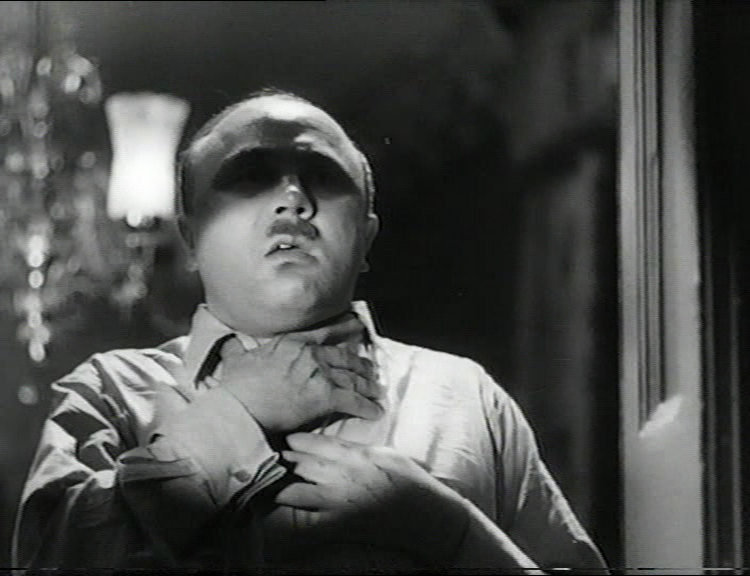
This is terrible! Not having time to really write anything, but having a film that demands and deserves a full and detailed appraisal. Forgive the brevity.
Nachts, Wenn der Teufel Kamm (1957) is a Robert Siodmak thriller whose title translates approximately as Nights, When the Devil Came. I have to admit that, as good as the film is, the subject of the film is even better. Nothing short of a masterpiece could satisfy the promise of this subject, but on the other hand, the subject is so strong that any halfway-reasonable approach to it automatically gets close to masterpiece status. It's that interesting.
Briefly, we have a fairly factual account of the investigation and arrest of a psychotic serial killer in Nazi Germany. A couple of gigantic ironies immediately lift the story into the extraordinary: the near-absurdity of trying to prosecute one murderer in a nation engaged in genocide; and the black joke of the killer's Aryan origins, which makes him a living insult to Nazi racial theory, an inconvenient example of a racially "pure" yet morally diseased citizen who should not, by the ideological dogma of the day, exist.

Above: What are they doing here? Taking a life mask of their suspect, yes. But is this physiognomy-criminology, or skull-measuring racial profiling? We never learn.
Siodmak, of course, was an old hand at the crime genre, having practiced it in Germany and France before the war, and then become a prime mover in the film noir genre in Hollywood, most notably with The Killers and Criss Cross. Abandoning Hollywood to become once more a European auteur, he bounced around a number of countries and genres with occasional successes and a few disasters. This is one of his best later movies. Parallel with his expressionistic, shadowy thrillers, Siodmak had also developed a realist vein, starting with his first feature, People on Sunday. This mode wove tendrils into his crime flicks, and would have found fuller expression in a project he developed but was rudely ejected from: On the Waterfront (Siodmak successfully sued the producers after he was removed without justification during pre-production). His last American noir, Cry of the City, takes the chiaroscuro policier out of the sound stage and into the streets of New York, hinting at what Siodmak might have done with Schulberg's dockside drama.

Nights, When the Devil Came, then, is an attempt to fuse both strands of Siodmak's oeuvre, the pulp fiction shocker and the real-life drama. Stylistically, he doesn't find a perfect common ground, but his story is so electrifying it hardly matters. Mario Adorf plays Bruno Luedke, a sex killer hunted by Claus Holm, an apolitical Kriminalkommissar who is simply trying to do his job, but under the supervision of the SS, who want to ensure that the man who gets convicted of the spate of murders is a suitable social undesirable, somebody whose removal from society will send the correct message.
I think you can see why this is a compelling subject. All I have time to say now, sadly, is that the film produces one utterly bizarre and incredible moment which smacks so strongly of truth, simply because it's so strange, that you have to believe it happened. Adorf has been caught. The police take him out to the country to look at his crime scenes and put together his case history. During a lull in the proceedings, Adorf, a hulking chap who has crushed many a windpipe as part of his M.O., suddenly lunges at one of the policemen, closing his gigantic paws around the hapless man's throat, roaring like a storybook ogre the while.

Then he lets go and laughs his ass off, as if to say, "Me, a killer? How silly!" His little joke. But it's a strange joke, since he is a killer, and he's already admitted he is a killer. It's as if homicidal maniacs are simply unable to think of themselves in those (accurate) terms. And there we might have a clue to the behavior of a lot of people in that particular society.
But now I must stop: like the beleaguered Kriminalkomissar, I have uncovered the truth, and as a result I must go far away. In his case, to the Eastern Front, and certain death. In my case, to bed, and uncertain sleep.
***
The Forgotten is a regular Thursday column by David Cairns, author of Shadowplay.